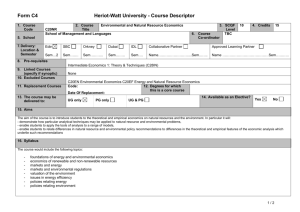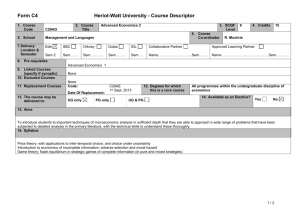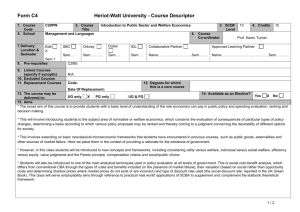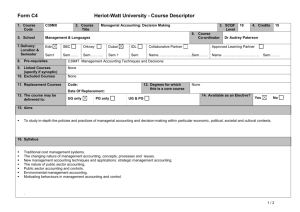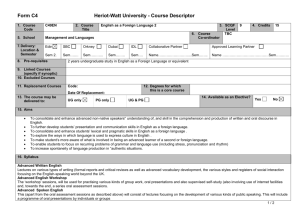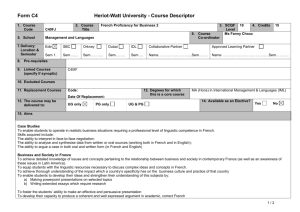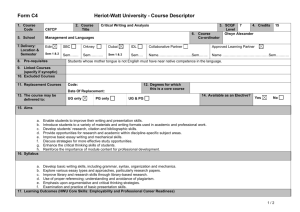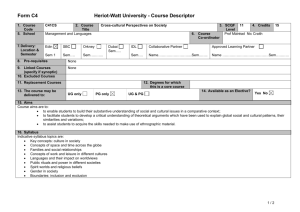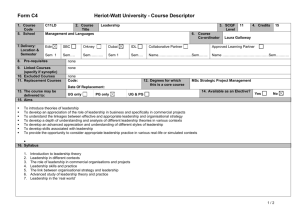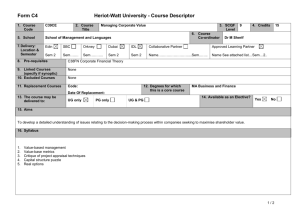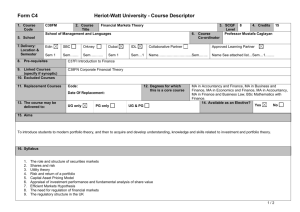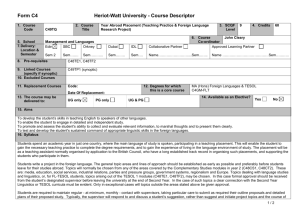C21EN_C4 - Heriot
advertisement
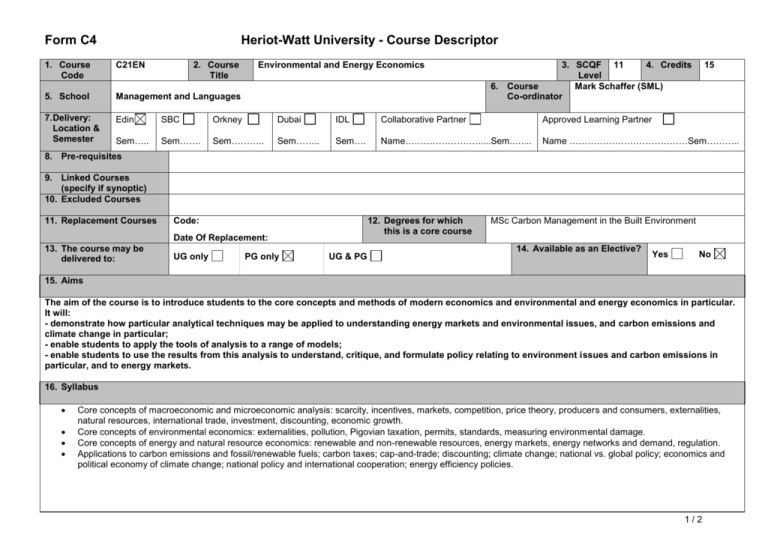
Form C4 Heriot-Watt University - Course Descriptor 1. Course Code C21EN 2. Course Title Environmental and Energy Economics 3. SCQF 11 4. Credits Level 6. Course Mark Schaffer (SML) Co-ordinator 15 5. School Management and Languages 7. Delivery: Location & Semester Edin SBC Orkney Dubai IDL Collaborative Partner Approved Learning Partner Sem….. Sem……. Sem……….. Sem…….. Sem…. Name…………………….....Sem..…... Name …………………………………Sem……….. 8. Pre-requisites 9. Linked Courses (specify if synoptic) 10. Excluded Courses 11. Replacement Courses Code: 12. Degrees for which this is a core course Date Of Replacement: 13. The course may be delivered to: UG only PG only UG & PG MSc Carbon Management in the Built Environment 14. Available as an Elective? Yes No 15. Aims The aim of the course is to introduce students to the core concepts and methods of modern economics and environmental and energy economics in particular. It will: - demonstrate how particular analytical techniques may be applied to understanding energy markets and environmental issues, and carbon emissions and climate change in particular; - enable students to apply the tools of analysis to a range of models; - enable students to use the results from this analysis to understand, critique, and formulate policy relating to environment issues and carbon emissions in particular, and to energy markets. 16. Syllabus Core concepts of macroeconomic and microeconomic analysis: scarcity, incentives, markets, competition, price theory, producers and consumers, externalities, natural resources, international trade, investment, discounting, economic growth. Core concepts of environmental economics: externalities, pollution, Pigovian taxation, permits, standards, measuring environmental damage. Core concepts of energy and natural resource economics: renewable and non-renewable resources, energy markets, energy networks and demand, regulation. Applications to carbon emissions and fossil/renewable fuels; carbon taxes; cap-and-trade; discounting; climate change; national vs. global policy; economics and political economy of climate change; national policy and international cooperation; energy efficiency policies. 1/2 Form C4 Heriot-Watt University - Course Descriptor 17. Learning Outcomes (HWU Core Skills: Employability and Professional Career Readiness) Subject Mastery Understanding, Knowledge and Cognitive Skills Scholarship, Enquiry and Research (Research-Informed Learning) Ability to understand the core concepts of modern economics Ability to understand how these core concepts are applied in the analysis of environmental externalities and carbon emissions and the analysis of energy markets and natural resources. Personal Abilities Industrial, Commercial & Professional Practice Knowledge of economic principles which lead to legislation, guides and commercial benchmarks and targets. Ability to analyse economic principles and communicate these within the construction sector. An ability to analyse and communicate how economic activity is related to sustainable activities. Autonomy, Accountability & Working with Others Communication, Numeracy & ICT The ability to understand the conflicting issues prevalent throughout the construction team in response to economic drivers and legislation. 18. Assessment Methods Method 19. Re-assessment Methods Duration of Exam Weighting (%) Synoptic courses? Method (if applicable) Examination Coursework Understanding and analysis of graphical data required. Report writing skills, including critical appraisal, discussion and argument. Information finding and appropriate referencing of cited materials. 2 hours Duration of Exam (if applicable) 70% 30% - Examination 2 hours 20. Date and Version Date of Proposal Date of Approval by School Committee Date of Implementation Version Number 2/2 Diet(s)
